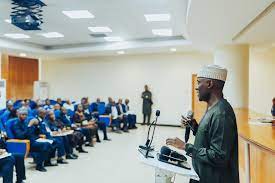Plans have been presented by the newly appointed Executive Vice Chairman (EVC) of the Nigerian Communications Commission (NCC), Dr. Aminu Maida, to increase the percentage of people in Nigeria who have access to broadband internet from the current 70% to an astounding 90% by the year 2025.
This information was shared with the Commission during an address that took place on Tuesday at the Commission’s headquarters in Abuja.
This new pledge is in line with the goals of President Bola Ahmed Tinubu’s “Renewed Hope” initiative, which aims to set the country on the path towards digital transformation.
Read also: Nigeria’s broadband penetration drops by 2.5 million
The new EVC of NCC Remarks
According to a press release, Dr. Maida, in his talk, emphasised the necessity of strategic focus on ensuring that all Nigerians have access to affordable and dependable internet services, which demonstrates the effective distribution of broadband infrastructure over the entirety of the country.
“We would align with this aspiration to increase broadband penetration to 70 per cent and to cover 90 per cent of the population by 2025. Therefore, we need to build a reliable telecom industry with impressive quality of service (QoS) indicators with quality of experience (QoE) as our watchword and ultimate goal. This also requires us to address a number of issues such as the Right of Way (RoW) challenge, ensuring security of our telecom infrastructure, among others. Efforts must be made to significantly improve service delivery by ensuring the NCC is performance-driven,” he said.
In light of the fact that quality of service (QoS) plays an essential part in the operation of telecommunications networks, Dr. Maida has set his priorities, which include the improvement of network quality and the support of the Federal Government’s vision for the development of a digital economy. In light of the widespread digitization of more and more elements of daily life, he emphasised the significance of establishing reliable broadband connectivity that paves the way for streamlined digital transactions, in addition to acting as the basis for e-governance and other socio-economic endeavours.
Nigerian Telcos Propose Regional Tariffs for Calls and Data to Address Taxation Challenges
Challenges Aminu Maida must solve in Nigeria
In order to increase the number of people in Nigeria who have access to broadband internet, Dr. Aminu Maida must overcome various obstacles. To quote him directly:
“Mr President has an agenda from which all of us are going to take our direction. The two major areas are job creation and enabling the digital economy. Where we are going in a nutshell is; that everything that we do in this Commission has to align directly with the Strategic Plan of the Hon. Minister of Communications, Innovations and Digital Economy, Dr Bosun Tijani, and ultimately to the Renewed Hope agenda of His Excellency, President Bola Ahmed Tinubu. We would not deviate from that.”
In order to get to the bottom of these problems, Dr. Maida has to concentrate on a few important efforts, such as collaborating closely with the appropriate government authorities to simplify the permission process and cut the expenses associated with it. This will make it simpler for businesses to install broadband infrastructure.
In addition, safeguarding the safety of important telecom infrastructure is absolutely necessary, and in order to do so, the EVC needs to work together with various security agencies in order to put protective measures and monitoring systems into place.
Dr. Maida is able to arrange public-private partnerships in order to promote the development of infrastructure in impoverished regions. These partnerships may take the form of subsidies or tax incentives offered to businesses that are willing to expand their networks.
In addition, increasing competition among Internet service providers (ISPs) can help lower rates and make broadband services more affordable. At the same time, regulatory measures may be required to guarantee that invoicing is transparent and that pricing models are fair.
Maida emphasised the vital role that efficient spectrum management and utilisation play in attaining the envisioned digital connection agenda while he was speaking about additional means by which internet access may be obtained. This is necessary in order to provide services to all people living in Nigeria as well as businesses located within the country.
According to him, having a good understanding of digital technology is very necessary in order to get the most out of the rising availability of broadband. Dr. Maida should also incorporate digital literacy into the education system and undertake public awareness campaigns to increase the digital abilities of the populace. This should be done in collaboration with the Ministry of Education and other relevant agencies.
In addition to this, the successful delivery of broadband services is dependent on the proper management of the spectrum. It is the responsibility of the EVC to guarantee that available spectrum resources are allocated and utilised in the most effective manner possible, hence lowering interference and increasing the quality of the network as a whole.
However, the new executive vice president has guaranteed that he would not break from the general path that the president has set, and that he will remain consistent in fulfilling his Key Performance Index (KPI).
“We would not entertain anything that deviates from this direction because my key performance indicators (KPIs) are fed into the Minister’s KPIs and the President’s KPIs come from the electorate that put him into power. The Hon. Minister has said clearly that he is ready to build a robust digital infrastructure and empower three million Nigerians digitally and we have to do our best to support him in this regard,” he stated.




